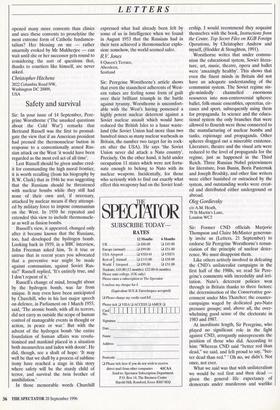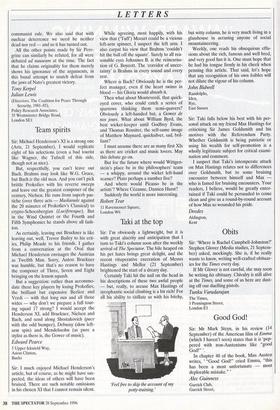Sir: Former CND officials Marjorie Thompson and Claire McMaster generous-
ly invite us (Letters, 21 September) to endorse Sir Peregrine Worsthorne's renun- ciation of the principle of nuclear deter- rence. We must disappoint them.
Like others actively involved in defeating the CND's unilateralist campaigns in the first half of the 1980s, we read Sir Pere- grine's comments with incredulity and irri- tation. Nato's deterrent policies won through in Britain thanks to three factors: the determination of the Conservative gov- ernment under Mrs Thatcher; the counter- campaigns waged by dedicated pro-Nato pressure groups; and, above all, the over- whelming good sense of the electorate in 1983 and 1987.
At inordinate length, Sir Peregrine, who played no significant role in the fight against CND, arrogantly misrepresents the position of those who did. According to him: 'Whereas CND said "better red than dead," we said, and felt proud to say, "bet- ter dead than red." ' Oh no, we didn't. Not once, not ever.
What we said was that with unilateralism we would be red first and then dead given the general life expectancy of democrats under murderous and warlike communist rule. We also said that with nuclear deterrence we need be neither dead nor red — and so it has turned out.
All the other points made by Sir Pere- grine can similarly be refuted, for all were debated ad nauseam at the time. The fact that he claims originality for them merely shows his ignorance of the arguments, in this banal attempt to snatch defeat from the jaws of Nato's greatest victory.
Tony Kerpel Julian Lewis (Directors, The Coalition for Peace Through Security, 1981-85), Policy Research Associates, 35 Westminster Bridge Road, London SE1



















































































 Previous page
Previous page